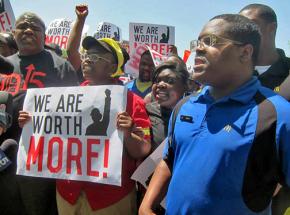Davids take the fight to Goliath’s home
reports from outside Chicago as McDonald's workers and their supporters gathered to protest outside the company's annual shareholders' meeting.
AS MANY as 2,000 McDonald's workers and supporters of the Fight for 15 traveled from 36 cities to march on "Hamburger University" in Oak Brook, Ill., on May 21 and 22. They were there to bring their demands to the fast-food giant's annual shareholders' meeting.
In what organizers called the largest single protest against McDonald's to date, more than 100 workers, many of them dressed in their work clothes, as well as dozens of clergy and community leaders were arrested by state police clad in riot gear on May 21, as the protesters tried to march on McDonald's corporate headquarters. The 138 protesters were charged with criminal trespass to property, according to the Oak Brook Police Department.
Drelynne Finley, a 24-year-old father of two and a McDonald's and Arby's worker, came halfway across the country, from Tampa, Fla., to be part of the protest. "They were giving us a warning...to leave the property," he said, "and when they did that, we pretty much yelled back, 'We won't be moved!" That's when I think everybody just sat down."

Asked what motivated him to risk arrest, Finley said: "One job is just not enough...I had to go and find a second job just because my wife lost her job due to her pregnancy."
These acts of civil disobedience were planned and coordinated nationally, bringing together workers' organizing committees that had never before participated in an action together. Activists in cities across the country--from Kansas City to Pittsburgh, from Houston to Detroit--mobilized to take part in this march on McDonald's.
"Instead of cutting off one snake on Medusa's head, we went to the heart," said Roman Fletcher, a 25-year-old protester from Madison, Wis. "McDonald's can't hide anymore, they can't hide their greedy side. They're not listening to us, the workers, but hopefully, by doing this action, other people are going to see it and catch on to this." The day after the arrests, hundreds of workers turned out again, protesting the shareholders' meeting scheduled to begin that day.
THESE PROTESTS came less than a week after low-wage workers and their supporters joined global strikes against poverty wages on May 15, when workers protested at McDonald's, Wendy's, Burger Kings and other fast-food restaurants in their cities to draw attention to low wages and poor working conditions.
While leaders of the Democratic Party have proposed a $10.10 an hour minimum wage, which they won't even fight for, workers in campaigns like the Fight for 15 are calling for wages that will actually lift them out of poverty--and a union that will give them a voice in the workplace.
Many of the chants during the Oak Brook protest reflected the confidence these actions can bring to the workers and activists who take part in them.
One of the strengths of the low-wage workers' movement has been its refusal to waver from the idea that fast-food workers deserve more than minimum wage for the work they do. As one chant goes, "$7.25 just ain't fair--started at the bottom, and we're still there."
During the protest, one worker from Detroit called out to a group of people around him, "Do we want 9.50?" "Hell no!" they shouted back. "What about 9.57?" he said. "Hell no!" came the reply. "11?" he asked. Then the whole crowd was chanting: "I want it, I want it, I want my $15!"
McDonald's is a fast-food industry leader, and therefore an excellent target for the campaign to raise the living standards of low-wage workers. According to an April report by Demos, fast food is "one of the highest growth employers in the nation." It is also an industry that has one of greatest gaps between CEO compensation and workers' pay.
The compensation of a fast-food CEO was more than 1,200 times the earnings of the average fast-food worker in 2012. Demos points out, "New analysis of the CEO-to-worker compensation ratio across industries shows that Accommodation and Food Services is the most unequal sector in the economy, and that this extreme pay disparity is primarily driven by one of the sector's component industries: fast food."
That's why it's so important for the workers leading this fight to bring their demands to the doorstep of the people who have been stealing from them. They're directly responsible for the hardship of their employees--all in the name of serving their shareholders, who have been growing rich with the massive profits produced by the workers.
This fact was clear to Roman Fletcher. "They [the shareholders] make lots of profit because of the workers, and they don't pay us the money that we deserve," he said. "They owe us money."
Actions like these at McDonald's headquarters help build solidarity among workers facing similar struggles at their workplaces back home. "It feels good because it lets you know that you're not alone in this battle," Fletcher said.
Drelynne Finley said: "I'm doing this for my family, and not just for mine. If you're a fast food worker, then I'm doing this for you as well. We're doing this not just for ourselves, but [for] all fast-food workers across the country."
This last series of actions marks a welcome escalation in the national strategy for this campaign, and the energy and chants coming from the workers made it clear that they will accept nothing less than $15 and a union.


